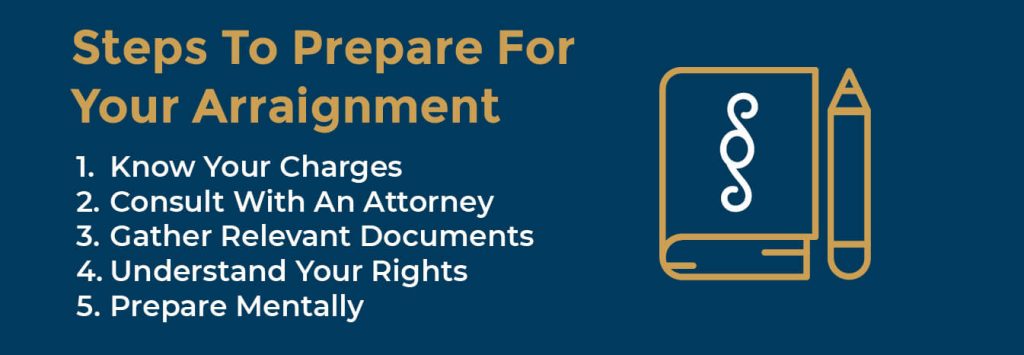
NEWS
How To Prepare For Your Arraignment
In the world of legal proceedings, the term “arraignment” often looms as a pivotal moment. But what is an arraignment, and why is being prepared for it crucial in the realm of criminal cases?
In this article, we’ll unravel the mysteries surrounding this essential step in the legal process. Whether you’re facing criminal charges yourself or simply curious about the arraignment hearing, understanding its significance and knowing how to prepare can make all the difference.
So, let’s delve into the heart of the matter and shed light on the arraignment process.
What Is An Arraignment Hearing?
An arraignment is a legal procedure where an individual accused of a crime is brought before a court. It’s the point where the accused is formally informed of the charges against them, and they are asked to enter a plea – typically “guilty” or “not guilty”.

This moment marks the official start of the legal battle that lies ahead. The legal significance of an arraignment cannot be overstated. It safeguards a defendant’s right to understand the charges and defend themselves appropriately. It sets the stage for the entire legal process, guiding the path towards either a trial or a plea bargain. It also ensures fairness and due process by allowing the accused to understand their charges, enter a plea, and start building their defence. It sets the wheels in motion for a legal journey that could lead to exoneration or conviction.
An arraignment is a crucial step that occurs relatively early in a criminal case. It usually happens shortly after the arrest, but the exact timing can vary depending on the jurisdiction and the severity of the charges. In some cases, it may happen within hours of the arrest, while in others, it might take a few days.
At its core, the arraignment process hearing serves several key objectives:
Informing The Accused: The accused is informed of the specific charges against them, ensuring transparency and clarity in the legal proceedings.
Plea Entry: The defendant is asked to enter a plea. This determines the course of action that follows, whether it leads to a trial, negotiations for a plea deal, or dismissal of the charges.
Setting Bail: In some cases, bail is determined during an arraignment hearing. Bail can secure the defendant’s release pending trial, ensuring they don’t pose a flight risk or danger to the community.
Scheduling Future Proceedings: The arraignment hearing helps set the timeline for future court appearances and proceedings, providing structure to the case.
Steps To Prepare For Your Arraignment

1. Know Your Charges
Understanding your charges is crucial for a successful defence. When you step into that arraignment hearing, you must have a clear grasp of the criminal charges against you.
Your defence strategy starts with obtaining detailed information about your charges, including specific statutes and potential penalties. This knowledge empowers you to make informed decisions about how to proceed. Moreover, it allows you to engage meaningfully with your attorney, providing them with the necessary details to craft a tailored defence strategy that addresses the specific charges you’re facing.
Being proactive in understanding your charges puts you in a position of control and clarity as you navigate the legal process.
2. Consult With An Attorney
Seeking legal counsel is paramount in a criminal case. Your attorney is your advocate, guiding you through the complexities of the legal system. Begin your search by looking for an experienced attorney specialising in criminal cases. Consult with several lawyers to find the one who best fits your needs, budget, and level of comfort.
Your attorney is not just someone you hire; they become your partner in crafting a defence. Their expertise in criminal law and their understanding of the local legal landscape are invaluable assets that can make a significant difference in the outcome of your case. Choosing the right attorney is a crucial step in ensuring a robust defence.
3. Gather Relevant Documents
Building a strong defence often hinges on the evidence you present with. To prepare effectively, gather all relevant documents such as police reports, witness statements, and any evidence tied to your case. These documents are the building blocks of your defence, potentially challenging the prosecution’s case or aiding in negotiations.
Additionally, by meticulously collecting and organising this evidence, you not only strengthen your defence but also demonstrate your commitment to presenting a well-prepared case. This attention to detail can influence how the prosecution and the court view your commitment to a fair legal process.
4. Understand Your Rights
Knowing your rights is fundamental to a fair legal process. At your arraignment, two essential rights come into play: the right to remain silent and the right to an attorney.

Remember, you are not obligated to incriminate yourself, and you have the right to legal representation throughout the legal process. Understanding and asserting these rights is crucial.
It’s important to note that exercising your rights responsibly and respectfully can influence the overall tone of your case. When done correctly, it sets the stage for a fair and balanced legal proceeding, ensuring that your rights are protected throughout the process.
5. Prepare Mentally
Facing an arraignment can be emotionally taxing. Mentally preparing yourself is vital to staying composed and focused during the hearing. Take some time to centre yourself and maintain emotional resilience. Consider meditation or deep breathing exercises to help calm your nerves. Remember that your attorney is there to support you and guide you through the process.
It’s also beneficial to reach out to a support network of friends and family who can provide emotional support during this challenging time. Preparing mentally not only helps you during the arraignment but also sets the tone for how you handle the emotional demands of the entire legal process. Staying resilient is a long-term strategy for a successful defence.
Consult With A Legal Professional Today!
Now, more than ever, it’s vital to take your arraignment preparation seriously. Your future may hang in the balance, and every detail counts. Don’t face this pivotal moment alone—reach out to Benjamin Leonardo – The Defenders who are dedicated to providing the guidance and expertise you need.
Remember, your arraignment isn’t just another legal formality; it’s the first step towards defending your rights and ensuring a fair outcome. Don’t hesitate to seek professional help and ensure your best possible defence. Contact Benjamin Leonardo – The Defenders, today, and let us stand by your side during this challenging time. Your future may depend on it.

